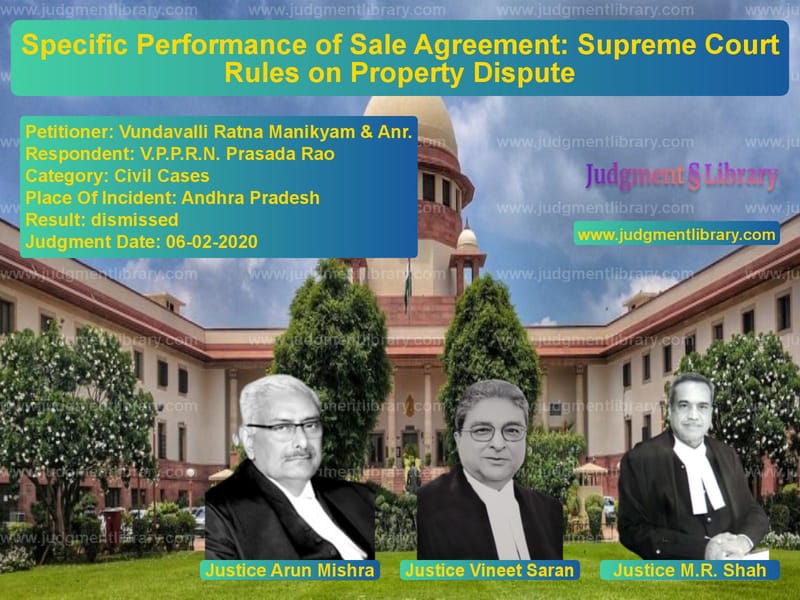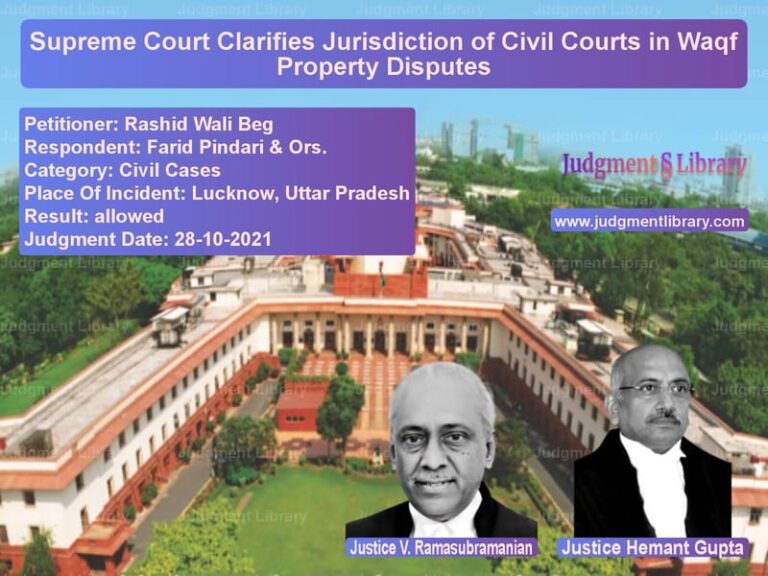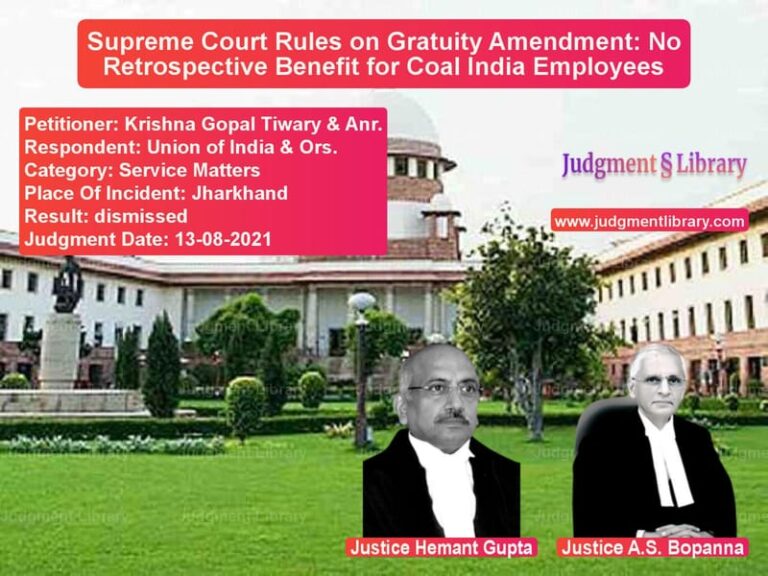Specific Performance of Sale Agreement: Supreme Court Rules on Property Dispute
The case of Vundavalli Ratna Manikyam & Anr. v. V.P.P.R.N. Prasada Rao revolves around a long-standing property dispute concerning the enforcement of an agreement to sell. The Supreme Court had to determine whether the agreement was enforceable despite the lapse of time and whether the suit was within the limitation period. This case sets a precedent for interpreting the Limitation Act in specific performance suits and reinforces judicial principles in property disputes.
Background of the Case
The dispute arose from an agreement to sell dated 7th May 1981, wherein the original owner, Nimmalapudi Ramaswami, agreed to sell the disputed land to the plaintiff, V.P.P.R.N. Prasada Rao, for a sale consideration of Rs. 59,200. An advance of Rs. 26,500 was paid, and the remaining balance was to be cleared within four months. However, the time for execution of the sale deed was later extended by an endorsement made on the reverse of the agreement, granting an additional eight months.
During the extended period, the State Government initiated land acquisition proceedings concerning the property. Both the seller and the plaintiff filed representations to exclude the property from acquisition, affirming that the land had already been sold to the plaintiff and that he was in possession. After protracted litigation, the High Court quashed the land acquisition proceedings.
However, after the death of the original owner, his wife, Nimmalapudi Veeramma (defendant), executed a sale deed in favor of Bogilla Satyanarayana Murthy (co-defendant), effectively transferring ownership to a third party. The plaintiff subsequently filed a suit for specific performance of the 1981 agreement, seeking enforcement of the contract.
Legal Issues Involved
- Whether the agreement to sell executed in 1981 was still enforceable in 1986.
- Whether the suit for specific performance was within the limitation period as prescribed under the Limitation Act, 1963.
- Whether the High Court was correct in applying Article 113 of the Limitation Act instead of Article 54.
- Whether the sale by the original owner’s wife to a third party was valid.
Petitioners’ Arguments
The appellants (defendants) contended:
- The suit for specific performance was barred by limitation under Article 54 of the Limitation Act, which prescribes a three-year period from the date fixed for performance.
- The agreement explicitly stated that the sale deed was to be executed within four months (or extended to eight months), meaning the limitation period expired in 1985.
- The High Court erred in applying Article 113 instead of Article 54 of the Limitation Act.
- The widow of the original owner had the right to sell the property, as the plaintiff failed to enforce the agreement within a reasonable time.
Respondent’s Arguments
The respondent (plaintiff) countered:
- The land acquisition proceedings were an external impediment preventing the execution of the sale deed, delaying the plaintiff’s ability to enforce the contract.
- The right to sue for specific performance only arose once the plaintiff formally demanded execution in 1986, and the defendants refused.
- The possession of the property had remained with the plaintiff, reinforcing the validity of the agreement.
- The High Court was correct in applying Article 113, as the refusal to execute the sale deed occurred in 1986.
Supreme Court’s Analysis
The Supreme Court examined the provisions of the Limitation Act and the conduct of the parties. Key observations included:
- Article 54 applies when a date for performance is fixed in the agreement. However, in this case, the execution of the sale deed was contingent on external factors (i.e., government acquisition), and thus the limitation period began when the defendants refused performance in 1986.
- Since the plaintiff actively pursued the cancellation of land acquisition, his delay was justified.
- The High Court was correct in applying Article 113, which provides a three-year limitation period from the date the right to sue accrues.
- The agreement to sell had not been disputed by the defendants, and the plaintiff remained in possession of the property.
Final Judgment
The Supreme Court ruled:
- The suit for specific performance was within the limitation period, applying Article 113 of the Limitation Act.
- The agreement to sell dated 7th May 1981 was valid and enforceable.
- The sale deed executed in favor of a third party was void, as the original contract took precedence.
- The defendants were directed to execute the sale deed in favor of the plaintiff within eight weeks.
- The plaintiff was required to pay an enhanced amount of Rs. 15,00,000 to account for the long lapse of time.
Impact of the Judgment
This ruling has significant implications for property disputes in India:
- It clarifies that limitation periods can be extended if external factors delay contract enforcement.
- It upholds the principle that contractual obligations cannot be evaded due to delay caused by government actions.
- It ensures that bona fide purchasers must exercise due diligence before buying disputed properties.
- It reaffirms that possession under an agreement to sell is a strong factor in deciding property disputes.
By upholding the High Court’s decision, the Supreme Court ensured fairness in contractual obligations and prevented misuse of limitation laws to avoid genuine transactions.
Petitioner Name: Vundavalli Ratna Manikyam & Anr..Respondent Name: V.P.P.R.N. Prasada Rao.Judgment By: Justice Arun Mishra, Justice Vineet Saran, Justice M.R. Shah.Place Of Incident: Andhra Pradesh.Judgment Date: 06-02-2020.
Don’t miss out on the full details! Download the complete judgment in PDF format below and gain valuable insights instantly!
Download Judgment: Vundavalli Ratna Man vs V.P.P.R.N. Prasada R Supreme Court of India Judgment Dated 06-02-2020.pdf
Direct Downlaod Judgment: Direct downlaod this Judgment
See all petitions in Property Disputes
See all petitions in Specific Performance
See all petitions in Judgment by Arun Mishra
See all petitions in Judgment by Vineet Saran
See all petitions in Judgment by Mukeshkumar Rasikbhai Shah
See all petitions in dismissed
See all petitions in supreme court of India judgments February 2020
See all petitions in 2020 judgments
See all posts in Civil Cases Category
See all allowed petitions in Civil Cases Category
See all Dismissed petitions in Civil Cases Category
See all partially allowed petitions in Civil Cases Category







